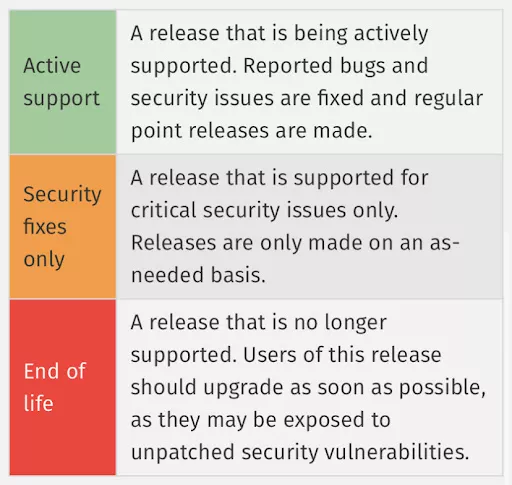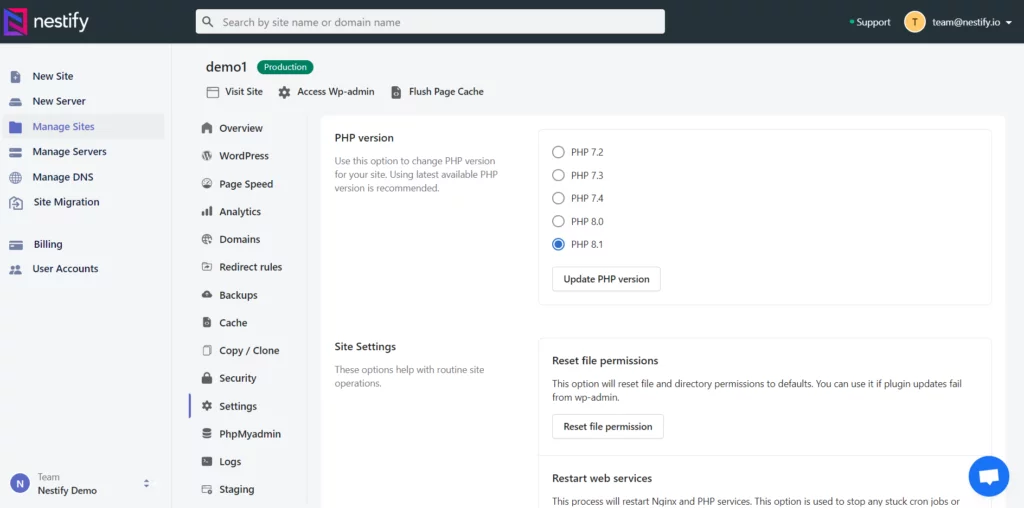Millions of websites around the world are run by the WordPress content management system. To create its dynamic web pages, WordPress relies in large part on PHP, a server-side scripting language.
The latest release of PHP 8.1 was in November 2021. In this post, we’ll examine PHP 8.1 in greater detail, covering its new features and explaining why you might want to make the switch.
Mentioned below are the PHP versions supported by WordPress.

Source: https://www.php.net/supported-versions.php

Overview of PHP 8.1 Upgrade
PHP 8.1 is the most recent release of PHP that includes a slew of new features and enhancements to the well-known programming language.
Enhancements to the JIT compiler, the introduction of the “never” type function, enhanced type inference, better error handling, and changes to the core functions and libraries are among the significant advancements in the newest release of PHP 8.1.
These enhancements can assist in increasing PHP application performance and reliability, as well as make it easier for developers to write high-quality code.
Features of PHP 8.1
The following are some of the most exciting features and improvements in PHP 8.1:
- The “never” Type: The “never” type enables developers to define that a function or method will never return a value. This can assist in detecting issues earlier and making programs more trustworthy.
- JIT Compiler Improvements: PHP 8.1 provides a variety of JIT compiler improvements that can assist in improving the speed of PHP applications.
- Enhanced Type Inference: PHP 8.1 features improved type inference support, which can help developers build code that is both efficient and reliable.
- Changes to Error Handling: PHP 8.1 offers a variety of error-handling improvements that can help make PHP programs more robust and easier to maintain.
- Updates to Core Functions and Libraries: PHP 8.1 contains a number of enhancements to core functions and libraries that can make it easier for developers to produce high-quality code.
Steps to upgrade to the latest version of PHP 8.1
Upgrading to the latest version of PHP 8.1 may seem daunting, but it can be a straightforward process if you follow the steps below:
- Check to see if your web host supports PHP 8.1: Check to see if your web hosting provider supports PHP 8.1 before upgrading. If they do, move on to the next stage. If not, you should think about switching to a service that supports the most recent version of PHP.
- Put your website to the test: It’s a good idea to test your website on a local development environment before upgrading to check that it runs properly with PHP 8.1. To create such a local development environment on your computer, make use of softwares such as XAMPP, WAMP, or MAMP.
- WordPress plugins and themes need to be updated: Verify with the creators of your WordPress plugins and themes to ensure they are PHP 8.1 compatible. If not, you may need to update or replace them before proceeding with the PHP 8.1 upgrade.
- PHP 8.1 upgrade: You can upgrade to PHP 8.1 once you’ve checked that your web hosting provider supports PHP 8.1 and that your WordPress plugins and themes are compatible. Shown below is the Nestify Dashboard. Change the PHP version on the hosting server panel in the dashboard by logging into your hosting account.

- After upgrading to PHP 8.1, test your website once more to confirm that everything is operating properly. If you run into any problems, examine the error logs and contact your site hosting company or the creators of your plugins and themes for help.
By following these instructions, you may upgrade to PHP 8.1 and take advantage of the latest features and improvements while maintaining the security and stability of your website.
Challenges and barriers that may be hindering PHP 8.1 upgrade
Despite the benefits of upgrading to PHP 8.1, there are several factors that may be holding back users from updating to the latest version. Here are some of the most common obstacles:
- Compatibility concerns: Compatibility issues with existing software, plugins, and themes are one of the main reasons people are hesitant to update to this new version. Older versions of WordPress or other CMS platforms may be incompatible with the most recent version of PHP, resulting in errors or even site downtime.
- Lack of technical knowledge: For users who are unfamiliar with the technical parts of web creation, upgrading to a new version of PHP might be scary. This could include changing server configurations, altering code to be compatible with the latest version, or simply learning about the new features and functionalities.
- Concerns about breaking the website: Customers may be apprehensive that upgrading would break their website, resulting in downtime or data loss. This anxiety is amplified for sites that are important to corporate operations, such as e-commerce or banking systems.
- Cost: Upgrading to PHP 8.1 may necessitate additional investments in terms of time, effort, or money in some circumstances. Users may, for example, need to acquire new software or employ a developer to help with the upgrade process.
- Lack of urgency: For some users, there may not be a compelling enough reason to switch to the most recent version of PHP. If their website is performing well on an earlier version, they may not feel the need to invest resources in updating to the most recent version.
While upgrading it to this latest version can bring many benefits to users, there are also several challenges and barriers that may be holding back adoption.
Users should carefully consider these factors and weigh the benefits and costs before deciding whether to upgrade to the latest version of PHP.
Why is upgrading to the latest version of PHP 8.1 important?
Upgrading to PHP 8.1 can bring several advantages to users, including:
- Increased Performance: This version features various performance optimizations that can help your website run faster and more efficiently. The JIT (Just-In-Time) compiler, for example, can drastically reduce the time it takes to execute complex code.
- Full-proof Security: This PHP version features various security enhancements, including increased input validation, better handling of cryptographic functions, and stricter error reporting. This can help prevent typical security flaws like SQL injection and cross-site scripting (XSS).
- Ease of Coding: Named arguments, union types, and attributes are among the new features and functionalities introduced in PHP 8.1. They can help developers build more sophisticated apps by making it easier to write and manage code.
- Better Problem-solving: Error handling has been improved in this version, making it easier to detect and debug mistakes in your code. This can assist developers in identifying and resolving issues more rapidly, resulting in more stable and trustworthy websites.
- New technology support: This version contains support for new technologies, such as the new TLS 1.3 encryption standard and the HTTP/3 protocol. This can assist in improving website security and efficiency while also providing users with a more enjoyable browsing experience.
Conclusion
PHP 8.1 is a fantastic upgrade to the popular server-side programming language, bringing an array of new features and enhancements.
Updating to the most recent PHP version can assist in enhancing performance, providing reliability, and offering the security of WordPress applications, as well as making it easier for developers to generate high-quality code.
Hence, if you use WordPress, it’s absolutely worth thinking about upgrading to the latest version of PHP to reap these benefits.



